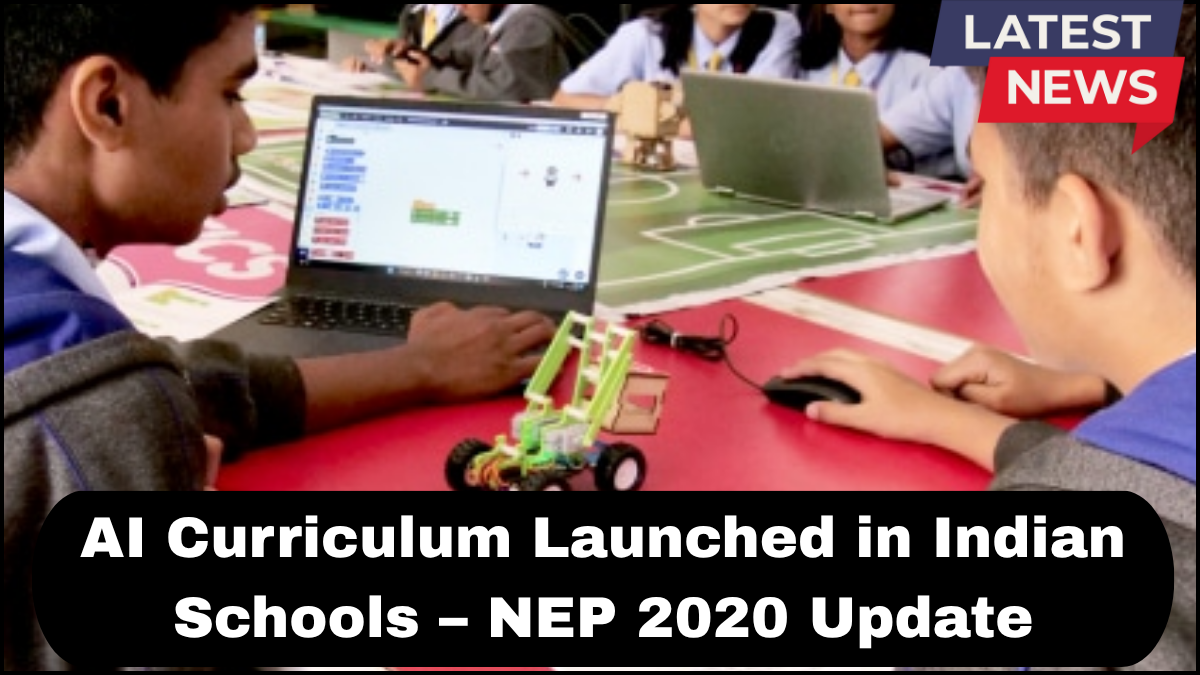India has taken a decisive step toward future-proofing its education system. In line with the National Education Policy (NEP) 2020, the Indian government has launched a structured AI curriculum in Indian schools, aimed at equipping students with the skills needed to thrive in the digital age. This move is not just about introducing a subject — it’s about redefining how students understand, interact with, and shape technology.

The Vision Behind AI in Indian Schools
The integration of Artificial Intelligence (AI) in Indian schools is a response to the growing global demand for tech-savvy professionals and thinkers. NEP 2020 advocates for an education system that is not only rooted in India’s traditions but also aligned with 21st-century demands. AI education is a key pillar in this vision, offering students a competitive edge in tomorrow’s job market.
The AI curriculum is designed to promote problem-solving, computational thinking, creativity, and digital literacy. It is being introduced at various school levels — starting from the basics in middle school and expanding to more advanced applications in higher grades.
A Structured Approach to AI Learning
The curriculum has been carefully developed to cater to different learning stages:
-
Middle School (Classes 6–8): At this level, students are introduced to basic AI concepts like machine learning, pattern recognition, data handling, and ethics in AI. Through interactive modules and gamified learning, the aim is to spark curiosity without overwhelming students.
-
Secondary School (Classes 9–10): Students start exploring practical AI tools and their applications in everyday life — from smart assistants to recommendation systems. They also learn the fundamentals of Python programming, basic data science, and simple algorithms.
-
Senior Secondary (Classes 11–12): Advanced AI topics such as natural language processing, neural networks, and AI ethics are covered. Students may engage in capstone projects or hackathons to apply what they’ve learned in real-world contexts.
This phased model ensures a solid foundation before diving into complex ideas, allowing students to progress naturally.
NEP 2020: The Driving Force
The NEP 2020 has transformed India’s education landscape with a clear focus on flexibility, skill development, and integration of technology. The policy encourages schools to adopt forward-looking curricula that prepare students not just for exams, but for life.
Under NEP 2020, subjects like AI are no longer extracurricular or optional—they are integral to the academic framework. The policy promotes interdisciplinary learning, where AI concepts are tied into subjects like mathematics, science, and social studies, providing real-world context and enhancing overall understanding.
Collaboration with Industry and EdTech
To implement AI in Indian schools effectively, the Ministry of Education is collaborating with tech companies, EdTech firms, and academic institutions. For example, partnerships with companies like Intel, IBM, and Google have led to the creation of customized AI learning modules, teacher training programs, and access to online resources.
Teachers are being upskilled through professional development workshops and certifications to deliver AI lessons with confidence and clarity. The goal is not only to educate students but also to build a sustainable teaching ecosystem around AI.
Impact on Future Readiness
Introducing AI early in the academic journey opens up a wide array of opportunities for students. It helps them:
-
Think critically about the role of technology
-
Explore future careers in robotics, data science, and automation
-
Understand ethical considerations in AI deployment
-
Develop a problem-solving mindset
This initiative is also expected to bridge the digital divide by ensuring students from all backgrounds have equal access to cutting-edge knowledge and skills.
India’s Role in the Global AI Landscape
By embedding AI into school education, India is positioning itself as a global leader in AI talent development. As demand for AI professionals continues to surge worldwide, this move ensures that Indian students are well-prepared to contribute meaningfully to innovation, research, and entrepreneurship.
FAQs
Q1: Why is AI being introduced in Indian schools?
AI is being introduced to prepare students for a technology-driven future, promote digital literacy, and develop essential skills such as critical thinking, problem-solving, and creativity.
Q2: What does the AI curriculum include?
The curriculum includes basics of AI, machine learning, coding (especially Python), data handling, ethical concerns, and real-world applications across different classes.
Q3: How does NEP 2020 support AI in education?
NEP 2020 emphasizes the integration of emerging technologies into mainstream education. It supports skill-based learning and interdisciplinary studies, making AI education a priority.
Q4: Are teachers trained to teach AI?
Yes, teacher training is a key part of the rollout. Government bodies and industry partners are offering resources and training programs to ensure educators are well-equipped.
Q5: Will AI be a compulsory subject?
In many schools, AI is being offered as an elective or skill subject, but its adoption is rapidly growing. The long-term goal is to make AI education widely accessible, if not compulsory.
click here to learn more